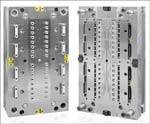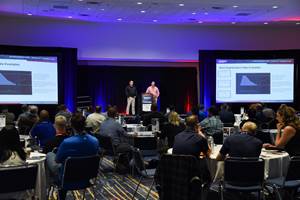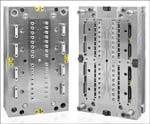Manufacturers for Fair Trade (MFT): United They Stand "or" Fighting The Good Fight
A group of moldmakers and manufacturers join forces to battle foreign competition and keep manufacturing alive and well in the U.S.
The popular saying "There is strength in numbers" should be the theme song for the Manufacturers for Fair Trade (MFT) - a coalition that includes organizations like AMBA, SPI, NTMA, CAMTI, Precision Metal Association (PMA), PA Tool and Die Summit and several other associations and companies. Its main purpose is to facilitate manufacturing associations and companies coming together to work on shaping public policy for small to medium-size manufacturing firms when it comes to overseas competition.
According to MFT president Dan Jepson - who also owns Jepson Precision Tool, Inc. (Cranesville, PA), a builder of custom thermoplastic injection molds for a variety of industries - the coalition was created in response to the crisis being caused by the loss of manufacturing in the U.S. "Foreign competition has been chipping away at U.S. manufacturing for several decades," he explains. "However, in the past few years, small and mid-sized U.S. manufacturers are going out of business at an alarming rate, and large manufacturers are rapidly moving their operations out of the U.S. because of foreign competition.
"This decline in U.S. manufacturing is critical because manufacturing does more than any other sector to stimulate the economy," Jepson continues. "The average income and consequent spending power of manufacturing workers is higher than that of any other sector and, because of its high multiplier effect, manufacturing directly or indirectly generates more jobs than any other sector. Furthermore, the loss of manufacturing represents the loss of many technologies critical to national security."
MFT Secretary Dave Frengel - who also is director of training and government relations for Saxonburg, PA-based Penn United Technology, Inc., a precision metalforming die maker and manufacturer - believes that it was time for U.S. manufacturers to come together and make a long-term commitment to change current U.S. policy. "I began to realize that what our country's leaders think they are seeing from 30,000 feet is very different from what we are seeing on the ground," he says. "Our national leaders are unaware of the real impact of current trade policy and the people to whom they are looking for input and advice are out of touch also.
"MFT leaders believe that manufacturing is essential to maintaining a strong, free and prosperous nation," Frengel continues. "Therefore, we believe that U.S. public policy must be more supportive of U.S. manufacturing and that manufacturing concerns committed to preserving critical domestic manufacturing must have a greater voice in shaping U.S. trade policy."
Joining Together
July, 2001 marked the first time that concerned business owners in the northwest Pennsylvania - one of the regions hardest hit by the troubled economy - held a summit in Erie, PA to call attention to the problem of foreign competition. Pennsylvania Congressman Phil English (R-PA) attended the meeting and decided to appoint one of his staff to work closely with the group over the next few months to help collect data regarding the moldmaking industry's predicament. Armed with this data, he then requested that the chairman of the House Ways and Means Committee instruct the U.S. International Trade Commission (ITC) to conduct a Section 332 Investigation on the effect of foreign competition on the industry.
As a result, Congressman William Thomas (R-CA) - Ways and Means Chairman - ordered the investigation in December, 2001 and an ITC hearing was held in Washington, DC in May, 2002. A majority of those who testified at the hearing owned small to medium-sized manufacturing companies from various parts of the U.S. - many of them moldmakers. Congressman English and Congressman Don Manzullo (R-IL) also testified, as did three industry associations and one large corporation. The report of the hearing and subsequent investigation by the ITC was released in October, 2002. This release officially documents a major crisis in the industry (visit www.usitc.gov for more information).
One day before the hearing, many of those who testified held an informal gathering to discuss long-term solutions to the problem. As a whole, the group felt that it would require a sustained broad political effort to adequately address what they called a serious national crisis. A steering committee was formed quickly to determine a plan of action over for the next several months, which was then joined by several other companies and associations - one of which lead to connections with Congresswoman Marcy Kaptur (D-OH). After meeting with several distressed business owners in Toledo, OH in July, 2002, Congresswoman Kaptur sent a letter - cosigned by Congressman Manzullo - to President Bush requesting that he create a task force to look into the problem at hand. Last August, committee members concluded that current U.S. economic and trade policy is not sufficient to steer the country through the unsteadiness of the new global economy. According to Jepson, this is primarily because multinational corporations, international banking, and other international concerns dominate U.S. economic and trade policy decisions. They also decided to form a new coalition to address this issue because they felt believed that no other organizations are effectively representing the fundamental interests of U.S. manufacturing with federal policy makers regarding international trade issues.
As a result, MFT was created at a meeting in August, 2002 in McLean, VA and names its mission "to identify and promote fair trade policies that preserve and advance U.S. manufacturing because manufacturing is critical to the strength and prosperity of our nation and its citizens." (see Governing Statements sidebar). Olav Bradley - a vice president of MFT and president of Schaumburg, IL-based PM Mold Co., Inc., a full- service company encompassing design concept to molded part - characterizes the loss of American jobs as "devastating, absolutely horrible" and emphasizes that MFT can - and will - make a difference.
MFT board member Michelle Cleveland - who also is vice president of the Right Place Program, Inc. (Grand Rapids, MI), a regional economic development group, regional manager of Michigan Manufacturing Extension Partnership Center (MEP) and vice president of CAMTI - also sees MFT impacting the way this country views manufacturing. "I admire this group of individuals that have dedicated themselves to this cause," she says. "They all are running businesses at various levels of success right now in this economy and to find the time to dedicate to this is amazing to me. There is just a dynamic swirl of activity around the value of manufacturing and what are we doing as a nation to understand how important it is and how it can grow through innovation."
Springing Forward
Today, the MFT coalition is poised to move forward by more aggressively recruiting additional members, seeking funding for its efforts and trying to gain more national support. "Our goal is to let the public know that free trade is essential to the future prosperity of all nations, but free trade has to be fair trade," Jepson emphasizes (see Fair Trade and its Relationship to Manufacturing table at the end of this article). "Any trade that is conducted in an unfair manner is detrimental to the country that is the victim of the unfair trade. It is the right of the victims of unfair trade to seek remedies to prevent unfair trade from occurring so that the goal of free trade can be achieved."
Furthermore, Frengel points out that MFT maintains that U.S. trade policy must "carefully balance the expansion of free trade with the maintenance of U.S. liberty, sovereignty and economic stability and that it must be crafted to maintain a balance of world power in favor of nations that support political, economic and individual freedom."
The MFT coalition cites China as a primary example of a country that "presumes to trade unfairly for self-benefit at the cost of global competitors," Jepson notes. "China uses subsidization of factories and subsidization of their infrastructures. Its people work very inexpensively - which in and of itself is not a problem - but because of the command and nature of their its economy there really is no room for advancement and no recourse for its employees to seek better wages. The government dictates what they will make: They do not receive any benefits, they do not receive any environmental protection, and the list goes on.
"In China, there is such a disparity in the standard of living, and it really is a command economy, so there is no opportunity for the Chinese to raise their standard of living so that we would have a chance to be competitive in their market," he continues. "It really is a closed market to U.S. goods and services - except for those that the government in China has deemed to be worthwhile for their efforts. Those companies are then courted and invited to build infrastructure within China so that they can do business in China. We do not require that in the U.S. - any country with a legitimate product can come into the U.S. market and market its product here. So, again, an unfair situation exists that actually encourages U.S. companies to move jobs from the U.S. to China just for the opportunity to produce low-cost goods there that they can then ship back and sell to the U.S. consumer."
Jerry Lirette - also a vice president of MFT and president of D-M-E Co. of (Madison Heights, MI), a supplier of a number of products to moldmakers and die makers in the U.S. and elsewhere around the world - adds, "Currently, there is a huge gap between free trade and fair trade. As an example, a mold base from China being imported to the U.S. is subject to a duty of just over more than 3 percent, whereas a U.S. mold exported to China is subject to economic barriers of just under less than 30 percent. The elimination of economic barriers alone will not solve all of the problems, but it is a start down the path of fairness that is currently being ignored.
"One of the primary goals of MFT will be to create an awareness of the tremendous gaps that exist between free trade and fair trade and influence policy makers to close the gap before the impact on the U.S. is irreversible," Lirette continues. "This is not just about the plight of the U.S. toolmakers - it is about the future of the U.S. itself. This country achieved its standard of living, its strength, and its position of prominence in the world as a result of its manufacturing capabilities. This strength is being allowed to erode as a result of trade practices that drive manufacturing offshore and ignore the future of the country in the name of free enterprise. As it erodes, our nation and the security of future generations suffers and will continue to do so with increasing severity. Our ability to protect and defend ourselves - let alone help other countries of the world - is deteriorating at an alarming rate. The trade deficit is skyrocketing monthly, and the government is not calling for any balance-of-trade measures. The mission in front of us is huge, but the stakes for our country and for our future generations are too high to ignore it any longer. As a nation, we must start molding our trade policies around the good of our nation and not around the public corporations that are trading our future for their next quarter's earnings."
To that end, MFT is moving forward with a Legislative Day planned for the spring - a move that MFT hopes will generate national awareness of the plight of manufacturing. MFT will begin Legislative Day by holding a press conference and then visiting legislators, senators and congressmen in Washington, DC from around the nation. "We are going to directly ask for their help with our efforts to seek to have either an Undersecretary of Commerce appointed or a special small manufacturing presidential task force appointed to bring to light all of the issues mentioned thus far and to have a voice within the government," Jepson states. "We do have a few congressional champions right now who have spoken out very strongly on our behalf. We want to go to them and ask them to sign on to an invitation to their remaining Congressional colleagues to join with them in making these requests."
Jim Zawacki, an MFT board member and president of GR Spring & Stamping, Inc. (Grand Rapids, MI) - a custom manufacturer of metal stampings, progressive die, slide stampings, springs, wire forms and value-added assemblies - who joined MFT because of his belief that manufacturing is the backbone of American society, brings years of experience to MFT's cause. In addition to working closely with MFT's board of directors, he also is chairman of the PMA and has been past president of the Spring Manufacturers Institute (SMI). He acknowledges that both associations are experiencing severe pressure from Asian competition. "Our trade laws need help," he emphasizes. "The strong dollar kills manufacturing, rules and regulations cost us more than any other country, and no one represents manufacturing in Washington, DC."
Gaining Awareness
Frengel is optimistic about MFT's goals. "I expect MFT to impact the public dialogue on trade policy significantly and that this will gradually get our national leaders to see that protecting our nation from destruction is not protectionism," he states. "Protecting the U.S. from destruction from any source - including economic - is good and it is their sworn duty. I expect to see Congress and the President develop a more intelligent approach to international trade."
Zawacki would like to see a department-level post of Secretary of Manufacturing created. "There is a Secretary of Agriculture when there is less then 5 percent of the gross domestic product (GDP) and 3 percent of the jobs in this sector," he says. "Can we not do the same for manufacturing?" Additionally, Zawacki feels believes that the U.S. should offer positive incentives for other companies to invest in this country, such as investment tax credit, tax incentives for hiring more employees in the U.S. fair-trade policies, limits on the amount of the unfavorable balance of trade any one country can represent to 10 percent, controls for medical costs, revisions to the legal system related to the Tort and Liability law, and massive education for the American public about lean - including labor management and government learning to be more competitive.
"This issue is much more than any one person or any one company or trade association can handle," Cleveland emphasizes. "Fortunately, various associations finally are coming around and are really beating the drum to the tune of manufacturing. We need to make recommendations - short-, mid- and long-term - to keep a viable environment to trade freely and fairly in the world's economy. It is really going to require the involvement of everyone in this country who understands and contributes to the economy. We need to let the world know what manufacturing means to this country's long-term viability in the global manufacturing economy."
"Everyone should be concerned about trade issues and the decisions that the government is making regarding the future of manufacturing," Jepson concludes. "We want to reach out to all manufacturing sectors and put forth a unified effort across the board." Clearly, the future of American manufacturing is at stake - as well as the strength of the U.S. as a nation.
| Fair Trade and its Relationship to Manufacturing |
| The MFT coalition supports the expansion of U.S. involvement in international trade and has taken the position that trade must be fair to remain free. What does this mean? How are free trade and fair trade defined, and how does this relate to government action regarding manufacturing?
Fair Trade Versus Free Trade On the other hand, the term fair trade refers to foreign trade that is well regulated by countries for their own good first and the good of others second - it is neither unnecessarily regulated nor foolishly unregulated. It is as open or as regulated as it must be from time to time to reasonably protect the well being of the country and its citizens while facilitating foreign trade. Furthermore, because foreign trade transpires between 2 countries, fair trade is foreign trade that is carried on between parties from nations who show mutual good faith toward one another's rightful laws and regulations. Protecting Versus Protectionism Much of the history of the economic improvement of nations and the advancement of liberty over injustice and oppression is the story of nations learning to understand and properly react to these harmful economic forces. This history includes the triumph of our Western tradition of private property and the rule of constitutional law against unregulated economic powers and totalitarian governments, especially as exemplified by the failure of communism in our own day. It is entirely fair for a country to properly regulate foreign trade to protect itself and its citizens from destruction by economic forces and even to ameliorate economic forces that seriously jeopardize its economic advancement. Laissez-faire libertarians who cry for free trade foolishly choose to ignore the past and would thus risk having to repeat the worst of it. When a country overregulates foreign trade to protect and advance its selfish self-interest, this is protectionism; however, it is not protectionism to properly protect that for which we are responsible, such as the future of our grandchildren. Why Is Manufacturing Important? A national economy based on nonmanufacturing business is extremely vulnerable to collapse attributable to war, terrorism or severe economic disruptions. Such an economy also would have great difficulty revitalizing itself without outside assistance if a collapse should occur. However, if an economy with a strong manufacturing base should collapse, it would have the means to revitalize itself without outside assistance. Furthermore, manufacturing is the milieu in which new applied technologies are developed from scientific discoveries. Without this function of manufacturing, our modern society would not have come about nor will it continue to advance. For example, Ben Franklin was the scientist who discovered electricity, but Thomas Edison and George Westinghouse were the manufacturers who commercialized this technology, gave us the light bulb for everyday household use and lent force to the electrification of our nation. Many of the new technologies developed by manufacturers are leading-edge technologies critical to our nation's maintaining its military advantage. If our nation's manufacturing base is weakened much further, we will not be able to keep pace with new technological developments that will become the basis for military superiority in the future. Already, we are experiencing signs of danger in this regard in our military and nuclear supply chain. For these reasons, the preservation of manufacturing is a vital key to the preservation of our national economy and our way of life. The Duty of Our Government Laissez-faire ideologues believe that if any nation, including the U.S., cannot survive in totally free competition in the global marketplace, then it is perfectly fine to just let it pass from history. The average U.S. citizen does not want our elected leaders to be so foolish and cavalier. For our national leaders to stand by and do nothing while U.S. manufacturing suffers irreparable damage from foreign trade would be a greater failure than when a business is severely damaged by the negligent management of its chief executives or when a head of household brings permanent harm to his or her family by failing to properly manage family finances. The present crisis in U.S. manufacturing calls for courageous leadership on the part of the Ppresident and Congress to quickly and effectively stop the destruction of U.S. manufacturing. What Should the U.S. Government Do? MFT calls for the following government action: The President should immediately convene a task force to study the severe damage being done to domestic manufacturing because of current U.S. trade policy. He should take quick short-term action to prevent further serious destruction while additional study and policy analysis is conducted and reforms are implemented. Congress and the President should work together to further investigate the dramatic negative impact the loss of manufacturing is having on our nation, to understand its importance for our future and to develop a national strategic manufacturing policy. The national strategic manufacturing policy should identify the level of domestic manufacturing essential to the lasting prosperity and security of our nation and the critical manufacturing technologies that must be preserved to support it. U.S. trade policy should be reformulated expeditiously to account for the national strategic manufacturing policy. Other factors that should be more carefully considered in the reformulation of U.S. trade policy are severe regional manufacturing dislocations caused by foreign trade and faster intervention to protect domestic manufacturing from blatantly unfair practices by foreign companies or countries. MFT also calls on the President and Congress to see that domestic manufacturing interests, including those representing small and mid-sized manufacturers, are given a more significant place at the table when U.S. trade policy decisions are being made. - MFT Board of Directors |
Related Content
MoldMaking Conference Session Spotlight: Data
Want to learn about digital workflows in mold design or ERP or global mold monitoring and asset management or the impact of tooling digitalization?
Read MoreCertified Quality Management for Plastics Professionals – Materials to Tooling to Recycling
Why is certification of a shop’s quality management system to ISO 9001, AS9100, IATF 16949 or ISO 13485 so special? What does the certification signify? And what supports the paper behind the framed certificate?
Read MoreFAQs: What Are the Leadtime Leader Awards?
Here are answers to some frequently asked questions about MoldMaking Technology's annual Leadtime Leader Awards competition.
Read MoreU.S. Economic Fundamentals Impacting Moldmaking
The economy continues to downshift, capping growth in moldmaking.
Read MoreRead Next
Understanding the Advantages Of U.S. Molds
The key to setting your shop’s direction toward the best targets is knowing one’s advantages when it comes to a U.S.-built mold.
Read MoreReasons to Use Fiber Lasers for Mold Cleaning
Fiber lasers offer a simplicity, speed, control and portability, minimizing mold cleaning risks.
Read MoreHow to Use Continuing Education to Remain Competitive in Moldmaking
Continued training helps moldmakers make tooling decisions and properly use the latest cutting tool to efficiently machine high-quality molds.
Read More










.jpg;maxWidth=300;quality=90)










